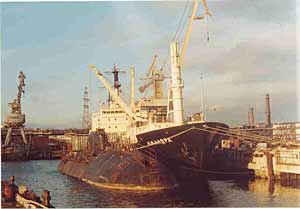
New Managing Director for Bellona Norway
The Board of the Bellona Foundation has appointed former Minister of Climate and the Environment Sveinung Rotevatn as Managing Director of Bellona No...
News

Publish date: May 21, 2003
Written by: Charles Digges
News
A landmark agreement negotiated by donor countries — called the Multilateral Nuclear Environmental Programme for Russia, or MNEPR — is signed May 21st in Stockholm and will release as a first step 62m in ecological funding to clean up Russia’s Northwest of spent nuclear fuel and radioactive waste generated as a result of the Russian nuclear submarine fleet operation in the area.
The Bellona Foundation views Wednesday’s singing ceremony in the Swedish capitol as a major step forward for Russia and its European partners to tackle enviroproblems. Bellona has been instrumental in advocating for MNEPR and drawing political attention from the European Parliament and the Russian Duma to navigate some of the treaty’s sticking points through the Inter-parliamentary Working Group established back in 1998.
The agreement will pave the way for projects in management of radioactive waste and spent nuclear fuel from Northern Fleet nuclear submarines, as well as heightening safety measures at Leningrad and Kola nuclear power plants.
The signing of the MNEPR agreement lays the groundwork and clears obstacles for financial assistance by an environmental protection support fund in the European Union’s Northern Dimension Environmental Program, or NDEP.
If NDEP can supply funding to tackle the radioactive threats facing Northwest Russia — for instance, the 248 reactor cores that are stored at Northern Fleet bases and which are equivalent to 99 tonnes of uranium in SNF — it will become as determining an influence on the Northwest’s environmental issues as CTR has been for non-proliferation in the former Soviet Union as a whole.
The accord is signed by representatives of Finland, Sweden, Norway, Denmark, the United Kingdom, Germany, France, Belgium, the Netherlands, Russia, and European Commission officials. It is also signed — in an unexpected last minute development — by the United States, which has apparently decided to lay aside a number of issues it has voiced.
MNEPR’s advantages
The agreement will defray tax issues that Russian officials had levied on some European nations in the framework of government to government bilateral agreements that were inked prior to MNEPR.
Unlike much US work, however, the text of the MNEPR agreement makes no mention of non-proliferation work. However, according to Norway’s Ambassador Torbjørn Norendal, the chief negotiator for the donor countries, no significant problems should arise for those nations taking part in MNEPR who have non-proliferation goals. He said, however, that negotiators did not want to amend the agreement at this late stage to include non-proliferation programming language in order that the agreement’s first version get into the diplomatic pipeline as soon as possible.
Russian response
The Russian Foreign Ministry this week told the Russian RIA news agency the MNEPR agreement carried "great significance in Russia." Foreign Minister Igor Ivanov will be attending the singing for Russia.
"This document can in the future be used as a benchmark for drawing up bilateral agreements in the context of the Global Partnership (on threat reduction)," said a ministry spokesman.
The Russians had earlier claimed that current Russian legislation would have made signing the MNEPR agreement impossible. But in negotiation turn-abouts, it has been decided that MNEPR will have temporary validity until it is ratified by the Russian Duma, which could be weeks or months off.
Taxes and liability
But the tax issue, and fears that donated money and equipment would be taxed by Russian authorities, had proved to be one of the agreements major sticking points since negotiations began in 1999. Western donors demanded that value-added tax for both foreign suppliers and their subcontractors — even if those subcontractors should be Russian companies — should be removed.
With today’s signing, it looks like the West got its wish.
Less clear are issues of liability should an accident take place while some nuclear clean up work is being performed. At present, the MNEPR agreement includes a so-called Nuclear Liability Protocol, which was separated from the initial agreement at the insistence of the United States, according to Norwegian Ambassador Norendal. The Umbrella Agreement that the US has with Russia through the Cooperative Threat Reduction programme — which is valid until 2006 — includes stricter liability codes.
Surprise US support
It was therefore expected that some of the nations would sign the protocol, but others would not. The United States signed the MNEPR agreement, but declined to sign the Nuclear Liability Protocol. Other countries who signed MNEPR also inked the liability document. But it was still progress. According to Norendal, something must have positively influenced the United States — which, according to Secretary of State Colin Powel had, until Saturday, no intention of signing the agreement.

The Board of the Bellona Foundation has appointed former Minister of Climate and the Environment Sveinung Rotevatn as Managing Director of Bellona No...

Økokrim, Norway’s authority for investigating and prosecuting economic and environmental crime, has imposed a record fine on Equinor following a comp...

Our op-ed originally appeared in The Moscow Times. For more than three decades, Russia has been burdened with the remains of the Soviet ...

The United Nation’s COP30 global climate negotiations in Belém, Brazil ended this weekend with a watered-down resolution that failed to halt deforest...